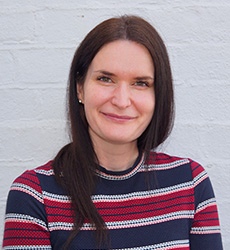Dr Lisa Ayers
What is your job title?
My job title is the Training Programme Director, Higher Specialist Scientist Training programme.
Which NHS and academic institutions do you work for?
I currently work for the NHS National School of Healthcare Science. I’ve worked for the Oxford University Hospitals NHS Trust as a Clinical Scientist and Oxford Brookes University as a Senior Lecturer and a Visiting Researcher. I also held an honorary contract with the University of Oxford as a Post-doctoral Researcher.
What do you like about being a clinical academic?
I enjoy the variety of the role, with no two days being the same. Also it is a real privilege to be able to work on a project right through from the generation of an idea up to seeing direct patient benefit. This isn’t always the case in other research settings. A clinical academic role allows you to build on existing relationships with other teams in the hospital and establish new ones.
Can you briefly describe how you became and developed as a clinical academic?
After completing my Clinical Scientist training, I wanted to continue some of the research I was involved with and build on the collaborations I had set up during my MSc project. I applied for one of first CSO/NIHR Healthcare Scientist Fellowships and used this to undertake a part-time PhD, whilst working as a Healthcare Scientist. I went on to apply for a NIHR Postdoctoral Fellowship, which involved working within a University Department based in my hospital. I also volunteered to take on teaching and research supervision responsibilities at both Undergraduate and Postgraduate level at both Universities.
Give one example of where your work has changed practice?
One study that I set up during my Postdoctoral Fellowship was initially a small scale study investigating the impact of cardiac stress on circulating microvesicles, a biomarker of inflammation. This grew into a multicentre study in order to recruit sufficient patients and has now become the largest Stress Echocardiogram Imaging study in Europe. It has generated data leading to changes in clinical practice and continues to grow.
What advice would you give to a healthcare scientist who is an aspiring clinical academic?
Take advantage of all the opportunities you can, even if they do not directly correspond to your job description or training programme. Get to know other researchers in your trust, even if they are in very different specialisms, there may be scope to collaborate with them. Find out about your local R&D office and what support they can offer you. Volunteer to give guest lectures/seminars/talks or support research project students from your local university. This is a great way to find out more about the research and teaching opportunities that they can offer.
